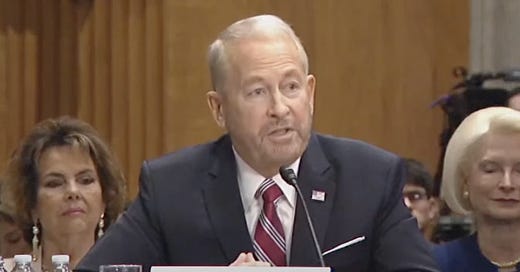Who is Ron Johnson, the next US Ambassador to Mexico?
If confirmed, Ron Johnson will have his hands full managing one of the most important bilateral relationships - at a time when US foreign policy is rapidly (and unpredictably) evolving.
As ambassador to Mexico, Ron Johnson would oversee one of the largest US diplomatic missions, consisting of 3,300 employees, nine consulates, and nine consular agencies. If confirmed, Johnson will have his hands full managing one of the most important bilateral relationships - at a time when US foreign policy is rapidly (and unpredictably) evolving. A date for the confirmation vote has not yet been set.
Who is Ron Johnson?
Ron Johnson, former US Ambassador to El Salvador, military officer, and longtime member of the intelligence community, has served the US government for over four decades. His recent confirmation hearing with the Senate Foreign Relations Committee highlighted his commitment to service and willingness to cooperate with the Mexican government to enhance security and facilitate trade - on both sides of the border.
Johnson’s public service career began in 1971 when he enlisted in the Alabama National Guard. He graduated from Officers Candidate School in 1973 and Special Forces officers courses in 1977. In 1984, he became a full-time active duty officer in the Army, serving as the detachment commander with the 3rd Battalion in Panama. During his nearly two decades of service in the Army, Johnson was primarily based in the Southern Command Area of Responsibility and held several command and staff positions.1 In these roles, he led combat operations in El Salvador during the country’s civil war in the 1980s and deployed to the Balkans in the 1990s as part of an interagency team tasked with arresting individuals accused of war crimes. Johnson was the first Special Forces officer selected to attend the CIA’s Army War College fellowship. He eventually reached the rank of Colonel before retiring in 1998.
After retiring, Johnson joined the US intelligence community, serving as Deputy Special Advisor to the Commander (US Special Operations Command) from 2006 until 2008 and as a senior representative for the Director of National Intelligence (DNI) and the CIA at US Southern Command. He also served as the Science and Technology Liaison to the US Special Operations Command at the CIA. In 2019, President Trump appointed Johnson as US Ambassador to El Salvador - a role he held until 2021. Of note, he received two of El Salvador’s highest honors: the Grand Order of Francisco Morazán and the Grand Silver Cross. In 2020, the State Department awarded Johnson the Sue M. Cobb Award for Exemplary Diplomatic Service.
Johnson’s 3/13/25 Confirmation Hearing:
Johnson was well-received during his confirmation hearing, almost all of the committee members touched on his previous role as ambassador to El Salvador and his extensive service in the military and intelligence community. In his opening remarks, Johnson emphasized his dedication to service, drawing on the values passed down from his father, a small business owner, and his grandfather, a sharecropper in Alabama. These experiences instilled in him a deep commitment to honesty, respect, accountability, and hard work, all principles he vowed to uphold while representing US interests in Mexico. He highlighted the deep economic integration between the US and Mexico, underscoring the shared security challenges and also, the strong cultural ties between the two nations. If confirmed, he pledged to focus on border security, curbing the flow of illegal drugs and migration, and advocating for fair treatment of US businesses. Throughout Johnson’s testimony, he consistently emphasized the need for mutual trust, cooperation, and ongoing dialogue with the Mexican government.
Johnson struck an optimistic tone, agreeing that the challenges confronting the US-Mexico relationship are abundant, but so are the opportunities for shared prosperity. He highlighted the Sheinbaum administration’s commitment to addressing migration, drug flows, and security concerns, citing Sheinbaum’s decision to send 10,000 National Guard troops to the border.
A few comments from the hearing worth noting:
Johnson said, in response to a question posed by Senator Cruz, that until recently he was unaware of the 1944 water-sharing agreement between the US and Mexico. He voiced concerns over Mexico’s delay in meeting its water commitments but did note that Mexico’s current administration is relatively new and that the country fell behind during AMLO’s term. He stressed the need for continuous engagement with Mexican officials to ensure compliance and pledged to work closely with leaders on both sides of the border to encourage timely water delivery.
Johnson noted that stopping the flow of drugs is paramount to the Trump administration, but acknowledged that drug flows cannot be immediately halted, but rather require sustained dialogue, cooperation, and improvement to effectively address the issue. When asked about whether the US government should take unilateral military action in Mexico, without the consent of the Mexican government, to address security concerns, Johnson stated that actions against cartels in Mexico should ideally be carried out in cooperation with the Mexican government. However, he did recognize President Trump’s "commitment to protecting US citizens and acknowledged that if American lives are at risk, all options, including unilateral action, could be considered. Regardless, collaboration with Mexican authorities remains the preferred approach.
Johnson mentioned Mexico’s potential role in the semiconductor supply chain, specifically in semiconductor assembly, testing, and packaging as part of a strategic shift from Asia.
In light of concerns about growing authoritarianism and democratic backsliding in Mexico, the nominee was asked about an incident during his time as ambassador to El Salvador during which President Bukele sent troops into the national assembly to pressure a vote. Johnson clarified that he publicly condemned Bukele’s actions and that he had privately advised against them beforehand, emphasizing that the event was a peaceful demonstration. He stated that the situation in Mexico is fundamentally different and returned to the topic of the importance of bilateral cooperation.
He achieved proficiency in Spanish during his time serving in the Southern Command.




